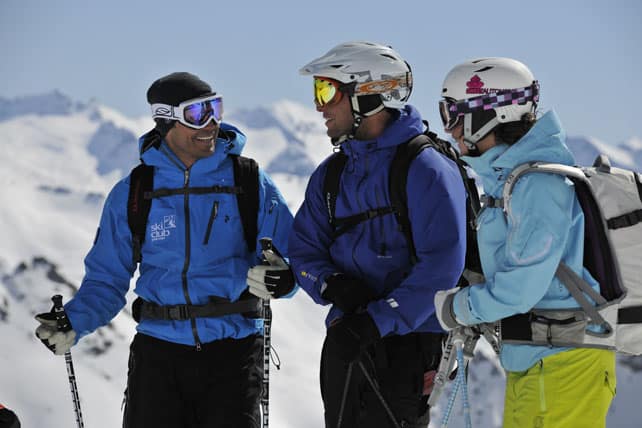
The French campaign against ski hosting has today claimed another casualty in the Alps – the Ski Club of Great Britain’s Ski Leader programme.
Ski Club Ski Leaders are based in popular resorts in both Europe and North America and provide a range of services for club members, which include organising and leading groups of skiers on the mountains. In France, this activity has come under close scrutiny in the wake of the February 2013 ski hosting ban; and as a result the Ski Club has decided to temporarily suspend the service in 11 French resorts during the 2014-5 season. It will be replaced by a more limited Ski Ambassador service.
In France, Article L.212-1 of the Code du Sport bans ski guiding (or the “animation” and “direction” of groups), whether on-piste or off, if the leader is paid for the service, and isn’t a qualified ski instructor or mountain guide. The Ski Club has always claimed the law doesn’t apply to its volunteer Leaders, who don’t receive any fees or wages for their work. However, they do get help with travel costs, as well as lift passes and accommodation: and this is seen by some as another form of remuneration. As a result, a Leader was stopped for questioning by French gendarmes on the pistes of Val d’Isere in April, and has been ordered to appear before an examining magistrate in Albertville in September to explain his actions in relation to Article L.212-1.
In a statement today, the Ski Club said, “The Ski Club is fully behind the Leader and has appointed a local lawyer who is well aware of the challenges involved and is currently representing UK tour operators in relation to the ski hosting ban.”
The timing of the Ski Club’s announcement is a little surprising, given that tomorrow, July 2, the appeal against the original ski hosting ban will be heard in a court in Chambery. As we reported back in February 2013, the original case was brought against British chalet specialist Le Ski, which is now supported by an alliance of British tour operators. Le Ski has already submitted a written argument to the appeal, which claims the regulations banning ski hosting are discriminatory – because, unlike everyone else, French civil servants and teachers “established in France” don’t need to have ski instructor qualifications to guide on the slopes. This, it argues, makes the ban unjustifiable under EU law.
Nick Morgan of Le Ski told Welove2ski today that “if you look at the facts in the cold light day you’d be forgiven for thinking we’ve got a strong case.” However he also believes that “this could go on for some time,” with further appeals and counter-appeals likely.
[July 3 update: Le Ski’s appeal has now been heard at Chambery, and a judgement is expected on September 4.]In the meantime, the Ski Club is taking no chances, and next winter its new Ski Ambassadors in France will be offering advice on where to ski, rather than accompanying ski club members onto the slopes.
As we’ve said on several occasions, Welove2ski thinks the ski hosting ban is a miserable state of affairs. In our view, you do not need to be a ski instructor to guide guests around a ski resort, provided you stay on-piste, and respect both the piste grading system and any avalanche warnings. Essentially, all you’re doing is using the resort’s piste map to inform your skiing choices each day: and if ski hosts or Ski Leaders can’t be trusted to use one, why should a piste map be deemed safe for the wider skiing public?
So we hope the ban is overturned, and that both the Ski Club, and British tour operators such as Le Ski, are able to reintroduce on-piste ski guiding/ski hosting in the near future. What we’re not hoping for, however, is that its Ski Leaders start to host groups off-piste again – which is another part of their weekly programme. By no means all Ski Club Ski Leaders are qualified ski instructors or mountain guides, and we believe no-one should be organising off-piste skiing groups without proper training – certainly more than the 12 days offered by the Ski Club to its Ski Leaders.
For more on the ski hosting ban, read our features “Are the Happy Days of Ski Hosting Over in France?”, “Is This the End of Ski Hosting in France?” and Crystal Side-Steps the French Ban on Ski Hosting”

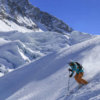
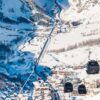
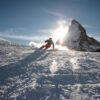
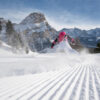
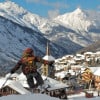
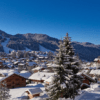

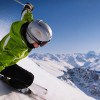
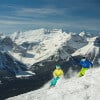
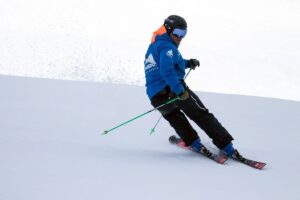
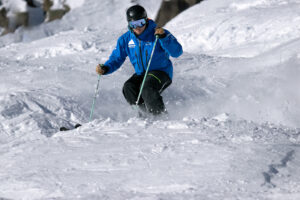
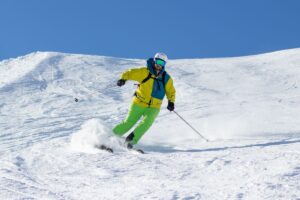
Just read the above article and saddened by the hole thing since it first started. I am a ski instructor but not qualified to ski in France. If I took my family and a group of friends to a French resort and guided them around a mountain I think I have more than enough skills to do it effectively. I have seen a lot of parents teaching their own children in France on the slopes and in my opinion badly. Are they going to be approached and arrested for having no qualifications? It would seem as long as you don’t get paid, which includes remuneration costs as mentioned in the article then its OK to guide in France, just as many people who have done for years. If a competent intermediate skier wanted showing around a resort I don’t think they would employ an instructor, which I believe is the bottom line in the French claims. I think they are shooting themselves in the foot.
Have to say I don’t share your view. As an adult I will decided what risks I take and if I wish to ski off paste I will, following whoever I choose. That may be anyone from a friend, to a guide, depending on my assessment. Same as if I was walking in the mountains. Or scuba diving. Or any of a multitude of other risky activities. The degree of professional support should be my choice, not yours.
Thanks for the comment! There are some circumstances when making your own mind up is okay: if you’re an experienced off-pister, skiing with other experienced off-pisters – and you’re properly trained and equipped. Knowing the resort you’re skiing in is important too. Under those circumstances, you’ll know what kind of questions to ask your “guide” and how to assess (and ski) the conditions yourself. But what if you’re new to the game? Of course, qualifications aren’t a guarantee of safety – William Carey’s avalanche story is a reminder of this. But they establish a system of quality control, and in an environment that’s as tough to read as the backcountry in winter, that’s got to be a good thing. After all, it’s not just you who’s going to take the rap if there’s an accident. Others may have to put their lives on the line to rescue you.
I am a ski instructor/alpine guide working in France and have also worked in Austria, Switzerland and Australia. I have come across ski leaders and ski hosts over the past 30 years and find the majority are not qualified ski instructors or trained in off-pist, avalanche and alpine security. The people guiding are usually on a free holiday all expenses paid and are not responsible for their actions. So I believe the French DDJS are protecting the skiing public from these special offers given by tour companies and ski clubs.
In France the ski instructor/guide must have all of his papers up to date with alpine security, first aid and carry a full avalanche kit with all guests. He is fully insured and everyone in the group will be signed in and out of the tour.
please don’t go off pist with these people I have seen the results!!
Sorry John but your comments are untrue. Please read the below link https://pistehors.com/news/ski/comments/1058-one-dead-one-missing-in-tignes-avalanche/ This is where UCPA took multiple classes of instructors off-piste in a high avalanche prone risk area. None of them had avalanche kit. This is why young lady did not make it. The only people in the area that had full avalanche kit that day and were able to help were Ski Club leaders on their course as it was close to the main Pisteur office they were able to deploy probes rapidly.
Worth thinking that Club leading might be a little different…
The Resort Leader, or Rep, as they were known until recently, is based in a resort to guide members of the Club, primarily. The ski with members and can take ‘temporary members’ for a day. There are cycling clubs with leaders leading them, scuba diving clubs with leaders ( probably PADI instructors) , walking clubs and so on and clubs bring people to the resorts.
Personally, I shall stick to skiing in Switzerland and hope the Swiss do not follow the French. Or Austrians
In St Anton, Austria I was told some years ago that leading a group whilst wearing a club or company jacket meant that you were liable for your group in case of accident. All permissible (thankfully) On Pidte but not off-piste . They cited that even ski instructors were not allowed off-piste- pnly qualified mountain guides.
Ski hosting has claimed another casualty in the Alps. https://t.co/03dxbW3MvG #ski #guides #alps
I have a son and daughter who are both qualified guides having completed their Ski Club of GB training in France. If I were running the Ski Club of GB, and this ban is upheld, the first thing that I would do is move the training from France to another European country where guides are welcome.
With all due respect Mr Stuart your son and daughter simply cannot be “qualified guides” having just completed the Ski Club of GB training. This cannot be compared to the off-piste guiding qualifications that guides in France (and all other mountainous countries) have to have and spend up to seven years getting them.
Sadly I saw the result of clients skiing with Ski Club of GB “guides” in Verbier several years ago. A young lad lost his life simply because they didn’t know where they could safely take their group.
Hello again,
I have been skiing for 50 years and been a ski instructor for over 30 of them. If UCPA had a group off piste without the correct kit and had a problem they would also be liable for prosecution in any nation.
To be a qualified ski guide SKGB can not deliver that level of licence as it must be accepted by the nation!
Just a note for all of the people guiding on or off piste. I was in Kitzbuhel several years ago and bumped into an ASSI(Artificial Ski Slope Instructor) with very limited skiing skills taking a school holiday group skiing. He had arrived on the same bus the children had and had never skied in the resort. I knew him from an artificial ski slope in the UK. This is still a common activity and needs to stop. If you want to be a ski guide try the TLSV in Austria and try a Ski Feura or Berg Feura course this will take you 4 weeks and you will need to be an expert skier just to get on the course.
Don’t let your families or kids go skiing with these people!!!!!!!!!!!!!!!!
Hi,
I did a SCGB Reps Course way back in 1989/90 and this is a two week course in Tignes.
The course was then instructed by Martin Epp, Serge Lambert and Fred Harper. These were the most eminent Mountain Guides at the time, each having lead their own groups all over the world.
They all told us that they all decided to offer their services to give the best advice they could, as they felt that if they did not, then other and far less suitable people would, and they all feel that would be a bad thing.
Although the course gave tuition on various issues, from layering of snow, different types of snow, how the weather impacted on the snow for days after snowfall, use of transceivers, they all agreed on one thing – That none of us should EVER think we had any ability to guide and that we should NEVER take anyone off piste. To become a qualified Mountain Guide, takes many years and even then your detailed knowledge is generally limited to the area you live in or know best all year around. Wider knowledge is then gained slowly and learned thoroughly.
On my course, I shared a room with Monty Montague, who, I learned later, died in an avalanche whilst guiding a group off piste in Verbier.
After the course, I went on to Rep in La Plagne, where to begin with the snow was in short supply, but then when it did arrive, it fell in abnormally large quantities and all the resorts closed due to the avalanche danger. Despite this, I had requests from some guests, including journalists to carry on skiing, which I refused. Some holiday makers skied a closed off run with a holiday company leader and the entire group were avalanched but thankfully all saved.
I had a furious call from the Ski Club of Great Britain office, demanding that I reinstate the skiing, which I had cancelled, due to the dangerous conditions, some members had evidently phoned to complain. I declined and suggested that the person should immediately visit the resort and see for herself why. Even the nursery slope had avalanched !
I see nothing wrong with SCGB Reps leading members around the pistes, showing them the best runs and restaurants etc. but they should NEVER think they know where to ski off piste, even if they have been there with a qualified Mountain Guide, as conditions change by the hour and you never know where crevices are hiding and where to go if cloud descends on you !
A good snow depth is critical for off piste skiing, especially safely built up layers and base. When there has been little snow and rocks are exposed, it is relatively safe, if it snows a little and there is then ten centimetres of fresh snow, a lot of rocks are covered and off piste suddenly becomes very dangerous / hazardous.
Ski safe and only follow qualified Guides, who do not take risks, know where to go for amazing powder skiing and then enjoy some memorable skiing, in safety, and repeat as often as you can !
Your view is entirely ours, Ian. No-one unqualified should take people off piste.
I ‘ski host’ family, friends, kids all over the Europe. No longer in France. French resorts are mostly old 1970s concrete with poor hospitality and service. There are exceptions and I am sure bunches of people with old time shares will be waffling on about great service, but the greater ski fraternity know, the French are generally insular, self protective and rude. Ski in Italy. Cappuccino and Bombardino are better and the Carabinieri in the resorts I go to know me by sight and name and smile each season when they see me. Says something about the differences in attitude…